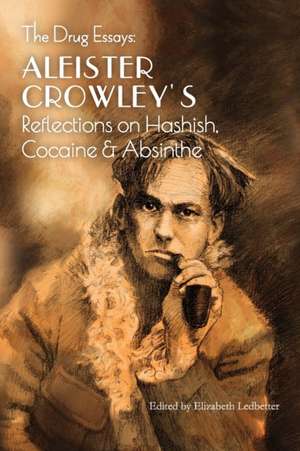The Drug Essays
Autor Aleister Crowleyen Limba Engleză Paperback – 28 ian 2020
| Toate formatele și edițiile | Preț | Express |
|---|---|---|
| Paperback (1) | 71.79 lei 6-8 săpt. | |
| Mockingbird Press – 28 ian 2020 | 71.79 lei 6-8 săpt. | |
| Hardback (1) | 161.51 lei 6-8 săpt. | |
| Mockingbird Press – 29 ian 2020 | 161.51 lei 6-8 săpt. |
Preț: 71.79 lei
Nou
Puncte Express: 108
Preț estimativ în valută:
13.74€ • 14.97$ • 11.58£
13.74€ • 14.97$ • 11.58£
Carte tipărită la comandă
Livrare economică 24 aprilie-08 mai
Preluare comenzi: 021 569.72.76
Specificații
ISBN-13: 9781946774712
ISBN-10: 1946774715
Pagini: 104
Dimensiuni: 152 x 229 x 7 mm
Greutate: 0.16 kg
Editura: Mockingbird Press
ISBN-10: 1946774715
Pagini: 104
Dimensiuni: 152 x 229 x 7 mm
Greutate: 0.16 kg
Editura: Mockingbird Press
Notă biografică
ALEISTER CROWLEY, born Edward Alexander Crowley; 12 October 1875 - 1 December 1947, was an English occultist, ceremonial magician, poet, painter, novelist, and mountaineer. He was the founder of Thelema, identifying himself as the prophet entrusted with guiding humanity into the Æon of Horus in the early 20th century. A prolific writer, he published widely over the course of his life. Born to a wealthy Plymouth Brethren family in Royal Leamington Spa, Warwickshire, Crowley rejected his fundamentalist Christian faith to pursue an interest in Western esotericism. He was educated at the University of Cambridge, where some biographers allege he was recruited into the British intelligence agency. In 1898 he joined the esoteric Hermetic Order of the Golden Dawn and was trained in ceremonial magic by Samuel Liddell MacGregor Mathers and Allan Bennett. He married Rose Edith Kelly, and in 1904 they honey-mooned in Cairo, Egypt, where Crowley claimed to have been contacted by a supernatural entity named Aiwass, who provided him with The Book of the Law, a sacred text that served as the basis for Thelema. Announcing the start of the Æon of Horus, The Book declared that its followers should adhere to the code of "Do what thou wilt" and seek to align themselves with their Will through the practice of magick. In 1907, he and George Cecil Jones co-founded a Thelemite order, the A¿A¿, through which they propagated their religion. After spending time in Algeria, in 1912 he was initiated into another esoteric order, the German-based Ordo Templi Orientis (O.T.O.), rising to become the leader of its British branch, which he reformulated in accordance with his Thelemite beliefs. Crowley spent the First World War in the United States, where he took up painting and campaigned for the German war effort against Britain, later revealing that he had infiltrated the pro-German movement to assist the British intelligence services. In 1920, he established the Abbey of Thelema, a religious commune in Cefalù, Sicily where he lived with various followers. His libertine lifestyle led to denunciations in the British press, and expulsion by the Mussolini in 1923. He divided the following two decades between France, Germany, and England, and continued to promote Thelema until his death in 1947. Crowley gained widespread notoriety during his lifetime, being a recreational drug experimenter, bisexual and an individualist social critic. He was denounced in the popular press as "the wickedest man in the world" and a Satanist. Crowley has remained a highly influential figure over West-ern esotericism and the counter-culture, and continues to be considered a prophet in Thelema.
